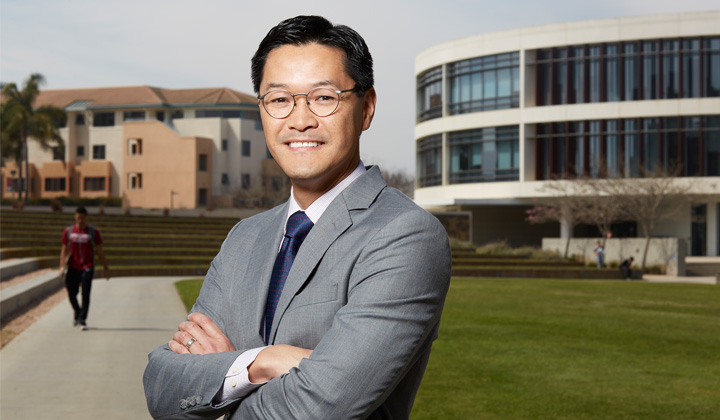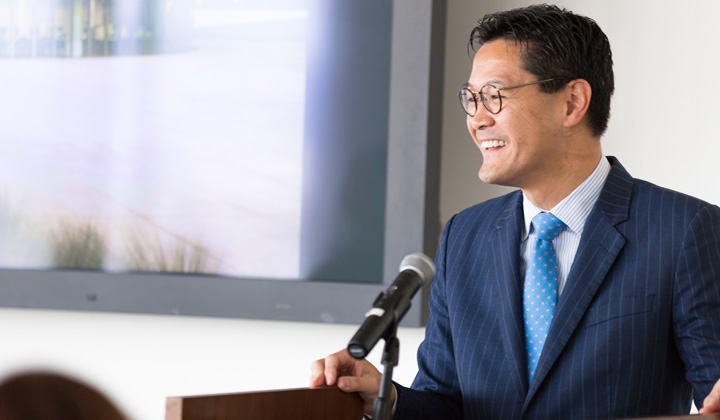A Message from Provost Thomas Poon, Ph.D.

Thomas Poon, Ph.D., became executive vice president and provost in 2017 and leads the university’s Academic Affairs, Enrollment Management, and Student Affairs divisions. He is also a tenured professor of chemistry. Here, he gives his view on how the pandemic illuminated different funding needs, and how private support will take LMU to new heights.
The reality of economic hardship hitting families was highlighted during the pandemic. We know that scholarships and financial aid are vitally important, and periods of disruption can affect our students’ ability to continue their education at LMU, creating a financial burden that can impact students’ academic and mental health and a potential loss of talent for our community.
Endowed scholarships allow donors to target programs based on their interests, and provide those programs, colleges, schools and departments the ability to be strategic in their recruiting efforts. Scholarship support creates long-term impact on programs through sustainability of excellence.
Immediate use scholarships allow the university to respond to constantly changing demographics, especially in our prospective students. Of the big four universities in Los Angeles, (UCLA, USC, Pepperdine and LMU), LMU is the most diverse by percentages of underrepresented students. Our diversity enhances our creativity, strengthens our ability to problem solve, and prepares our students to contribute to our global society. Our demographics really speak to this need for immediate scholarship resources. It allows LMU the best flexibility to recruit outstanding students in a variety of disciplines and majors. Immediate use scholarships give us the opportunity to excel in the short-term, allowing us to make significant gains in quality and ranking. Overall, the mix of endowed scholarships and immediate use scholarships allows LMU to balance the short-term challenges and opportunities, while also securing our future as the destination of choice for students.

Research shows that students benefit the most from what are known in higher education as high-impact practices. These practices actively involve students, connecting them to mentors and peers that impact or impart career, academic, and life skills to students. High-impact practices also increase retention and graduation rates. Any fundraising initiative that increases exposure or involvement for students in high-impact practices will be key to our success in helping all of our students succeed and graduate on time. Some examples of how philanthropy can make these high-impact practices possible are:
1) LMU internship placement program. Research has shown that college students who participate in internships early on in their academic career form life-long bonds to their alma mater. LMU students are highly competitive in getting internships, but many companies have shifted to unpaid or low-paid internships as a major form of recruitment. Donors can provide funding to offset the costs associated with participating in unpaid or low-paid internships.
2) The First To Go program is an example of a targeted initiative that embodies our Jesuit and Marymount traditions by offering valuable resources and opportunities for first-generation students’ academic, professional, and personal growth. It is a community grounded in academic and co-curricular success that provide workshops, retreats, mentorship and advocacy to ensure students maximize their LMU experience. Through philanthropy we have been able to provide sustained support that has allowed the program to grow and assist a larger population of students.
3) Our interdisciplinary centers and institutes provide high-impact practices in the form of research opportunities for undergraduates. For example, the Marymount Institute for Faith Culture and the Arts, in their role as book publishers, employs five to 10 students every semester providing valuable experience in the publishing industry. The Thomas and Dorothy Leavey Center for the Study of Los Angeles engages multiple teams of students every semester to conduct surveys in the community that provide valuable data and analysis to private firms and public offices in the region. The Center for Urban Resilience utilizes research students every year to conduct science and ecology research around L.A. Donor support allows students to participate in these life-changing experiences, and helps LMU create even more avenues for students to create the world we want to live in.
4) Study abroad. Data has shown that LMU students who study abroad have a much higher graduation rate than students who do not. Students who intend to study abroad increase their engagement in the LMU community and commit to their studies in ways that prepare them for their intended experience. After they study abroad, students return transformed and energized to apply their newfound skills in their remaining junior or senior years. The data and statistics related to this phenomenon are tremendous in every category and demographic. The graduation rate for students who study abroad is well over 95 percent. Your generous support of initiatives and scholarships in this area will enable more students to study aboard to attain that invaluable global learning experience.
Having activities that engage and energize our students is vital to our success, but so too are facilities that enrich and enliven our campus. New buildings that expand and enrich our offerings are not only impactful for our students, but elevate our rankings and highlight our successful alumni as well. Alumni love coming back to campus and see that we are growing in these areas. For example, the new Howard B. Fitzpatrick Pavilion, the Drollinger Family Stage, and the Bruce Featherston Life Sciences Building have brought new energy to our students, excitement from our alumni, and attention from external audiences that elevate LMU’s reputation. Philanthropy is both an avenue for growth and a demonstration of pride from our alumni, parents and friends.
Thank you for your interest in supporting LMU. To contribute to the high-impact programs and practices described in this story, visit here.